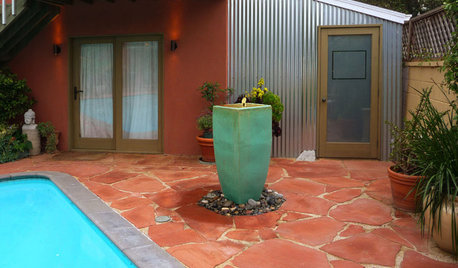More Information, Please
friedag
10 years ago
Related Stories

BEFORE AND AFTERSMore Room, Please: 5 Spectacularly Converted Garages
Design — and the desire for more space — turns humble garages into gracious living rooms
Full Story
LANDSCAPE DESIGNGet More From Your Garden by Mixing Things Up
Consider an eclectic outdoor style with defined hardscapes softened by exuberant, informal plantings
Full Story
COLORBedroom Color: The Secret to More Sex and More Sleep
Look to surprising revelations about bedroom wall colors to get more of what you want
Full Story
HOME OFFICESQuiet, Please! How to Cut Noise Pollution at Home
Leaf blowers, trucks or noisy neighbors driving you berserk? These sound-reduction strategies can help you hush things up
Full Story
GARDENING GUIDESGreat Design Plant: Silphium Perfoliatum Pleases Wildlife
Cup plant provides structure, cover, food and water to help attract and sustain wildlife in the eastern North American garden
Full Story
GARDENING GUIDES9 Fresh Herbs for Crowd-Pleasing Thanksgiving Dishes
Pluck these herbs from a windowsill pot or a garden for a Thanksgiving meal that sings with fresh flavor
Full Story
GARDENING GUIDESGreat Design Plant: Snowberry Pleases Year-Round
Bright spring foliage, pretty summer flowers, white berries in winter ... Symphoricarpos albus is a sight to behold in every season
Full Story
ARCHITECTUREDesign Workshop: Just a Sliver (of Window), Please
Set the right mood, focus a view or highlight architecture with long, narrow windows sited just so on a wall
Full Story
GARDENING GUIDESGreat Design Plant: Ceanothus Pleases With Nectar and Fragrant Blooms
West Coast natives: The blue flowers of drought-tolerant ceanothus draw the eye and help support local wildlife too
Full Story
ADDITIONSMore Room Makes an Eichler Even More Livable
Adding a master suite gives a California family 450 square feet more for enjoying all the comforts of home
Full Story


veer
friedagOriginal Author
Related Discussions
equine relief/katrina
Q
Ontario Hummingbird Project
Q
Capital Beltway Horticulture Shows
Q
Allen Plant Swap - 10 more days
Q
friedagOriginal Author
friedagOriginal Author
woodnymph2_gw
janalyn
veer
friedagOriginal Author
annpan
annpan
veer
woodnymph2_gw
veer
friedagOriginal Author
friedagOriginal Author
friedagOriginal Author
annpan
friedagOriginal Author
carolyn_ky
annpan
sheriz6
friedagOriginal Author
janalyn
friedagOriginal Author
friedagOriginal Author
friedagOriginal Author
veer
sheriz6
veer
friedagOriginal Author
friedagOriginal Author
janalyn
friedagOriginal Author
sheriz6
J C
carolyn_ky
sheriz6
annpan
friedagOriginal Author
veer
carolyn_ky
friedagOriginal Author
annpan
friedagOriginal Author
colleenoz
friedagOriginal Author
colleenoz
janalyn
annpan
friedagOriginal Author